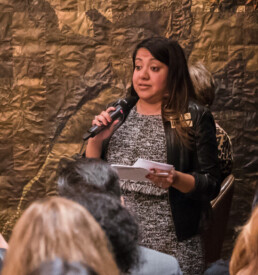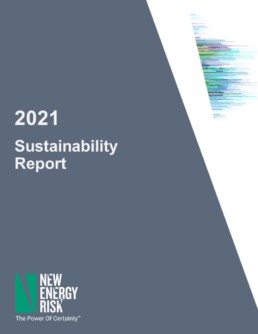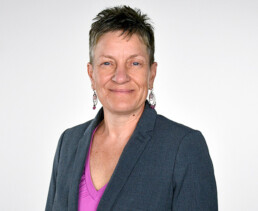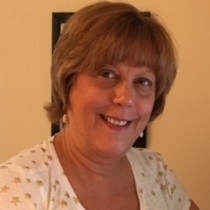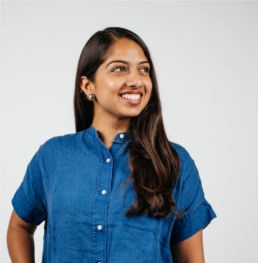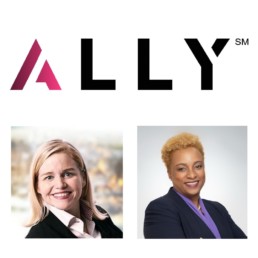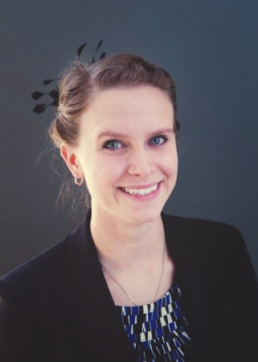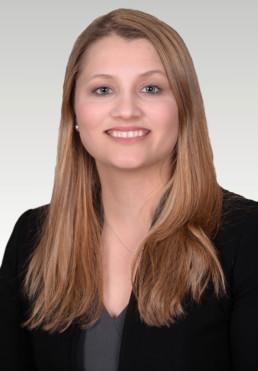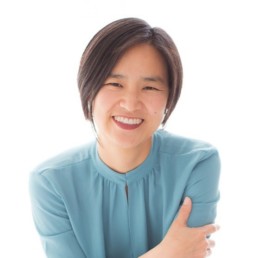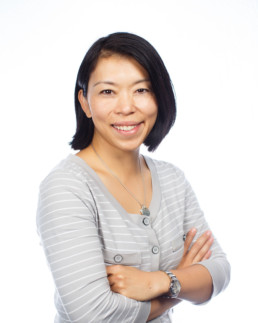Interview: Vinita Jajware-Beatty, Enkompass
Interview: Vinita Jajware-Beatty, Enkompass
We are inspired by people who are passionate about insurance, project finance, and technology that solves pressing global challenges. In this interview series, our chief actuary, Sherry Huang, talks with friends of New Energy Risk whose work makes a difference, and whose journeys will inspire you, too.
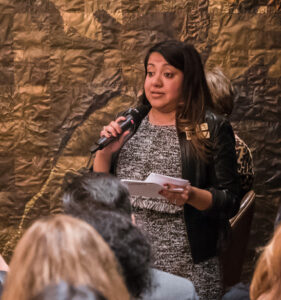 I first met Vinita Jajware-Beatty at the Women In Insurance Tech Conference in 2022. She was the chairperson of the conference, partnering with the organizer (Altaworld) and representing the Toronto Insurance Women’s Association (TIWA) as its president. The conference included a wide range of topics on innovative technologies serving the insurance industry. Vinita was the best MC I have ever met at any conference. She was knowledgeable, engaged, and authentic, reading the room and connecting the dots between different segments of the insurance industries, technology vendors, as well as current trends.
I first met Vinita Jajware-Beatty at the Women In Insurance Tech Conference in 2022. She was the chairperson of the conference, partnering with the organizer (Altaworld) and representing the Toronto Insurance Women’s Association (TIWA) as its president. The conference included a wide range of topics on innovative technologies serving the insurance industry. Vinita was the best MC I have ever met at any conference. She was knowledgeable, engaged, and authentic, reading the room and connecting the dots between different segments of the insurance industries, technology vendors, as well as current trends.
I spoke to Vinita afterwards and found out she has a diverse background that combines engineering risk assessment and various related insurance applications. Vinita is currently the Chief Operating Officer of Enkompass Power & Energy Corporation, a national engineering and field services firm, Enkompass has operations rooted in industries including construction; telecommunications; healthcare; manufacturing; food and beverage; pharmaceutical; mining; and insurance.
Vinita is responsible for operational oversight of engineering and field services including Enterprise Risk Management and Human Resources, while maintaining a loss control engineering and commissioning professional practice. In addition to her leadership roles at Enkompass, TIWA and Altaworld, Vinita also serves as Chair of Dive In in Canada, a Diversity, Equality and Inclusion (DEI) initiative from Lloyds of London.
After our meeting, we are excited to find out more about each other’s work as we both operate on the intersection of engineering and insurance. I am also intrigued by her drive for excellence and sense of purpose in moving DEI forward.
This interview has been lightly edited for length and clarity.
Please tell us a little about how you got to where you are today.
Through grit, hard work, and perseverance. I was fortunate to have excellent mentors and career champions along my journey but even with those resources it did not replace the hard work needed along the way.
You are the best MC I have ever met! What foundations provided you with the building blocks for your communications skills?
Thank you for the kind words! I was fortunate that, at a young age, I was able to hone my public speaking skills through extracurricular activities in student leadership going back to my early high school days. Through my work with the Toronto South Asian Film Festival (Filmi) and starting a not-for-profit organization within the student leadership space, I was able to hone both my public speaking and media facing experience.
How do engineers and insurance professionals view risk differently?
Insurance professionals tend to think in absolute terms with very little grey area and this is often reflected in traditional insurance policies. Engineers are trained, regulated professionals who manage risk by nature of their profession, typically dealing with one or more constraints at the same time, while attempting to solve a problem. As the engineering profession is regulated around public safety and welfare, this places the onus of risk mitigation as paramount in the professional’s practice. Some creative insurance professionals also view risk in the same lens and ensure their policies are treated the same way.
Has there been a mentor(s) in your life who changed the trajectory of your career path?
I am very fortunate to have had many mentors over the last fifteen years of my career. These individuals include clients, senior engineering colleagues, and the insurance executives and professionals that I am privileged to work with on DEI initiatives. I would be remiss if I did not mention Professor Helmut Brosz and Steve Paniri, two senior electrical forensic engineers who were instrumental in providing me with a strong technical foundation, as well as Eileen Greene with HKMB HUB International for her guidance, mentorship, and support over the years.
What is your leadership style?
Based on conventional leadership archetypes, I definitely identify as a Servant Leader. In today’s knowledge-based workforce that can be an advantage toward motivating teams to reach their goals and objectives. At the same time, I am also an empath and that can be a challenge to compartmentalize the issues within a team and not have that affect me personally.
What does success mean to you?
Being able to live wisely, agreeably, and well by knowing my personal values, morals, mission, and vision is aligned with the work that I do. Having the freedom to pursue projects and initiatives that align with those values and general purpose is how I define success, as well as the means to support the goals of my family.
NER Releases its 2021 Sustainability Report
Sustainability is at New Energy Risk's core. Our business model delivers performance insurance solutions to a wide range of energy technologies and related infrastructure projects and technologies that have a major impact on our world, from reducing emissions, to creating more sustainable fuels, to finding new uses for municipal and industrial wastes, to new models for low-carbon transportation. We help drive these technologies to scale and foster greater customer adoption to accelerate a more sustainable society.
We are proud of our clients, who are committed to solving some of the world's most pressing environmental issues. Collectively, they are reducing landfills and building a circular economy, reducing dependence on aging centralized power grids, reducing transportation’s dependence on petroleum, and preventing harmful greenhouse gas emissions.
Read NER's 2021 sustainability report from our CEO, Tom Dickson, chief actuary and managing director of underwriting development, Sherry Huang, and senior scientist, Shawn Lee. The report details the climate, sustainability and environmental impacts of NER’s client portfolio, where innovations to reduce carbon intensity for fuels and power as well as to promote the circular economy and curb wastefulness have led to great impact in multiple measures.
Interview: Denise Olson, Zurich
We are inspired by people who are passionate about insurance, project finance, and technology that solves pressing global challenges. In this interview series, our chief actuary, Sherry Huang, talks with friends of New Energy Risk whose work makes a difference, and whose journeys will inspire you, too.
Denise Olson is the head of programs at Zurich North America. I reached out to her earlier this summer to ask her about her career transition from an actuary to an underwriter and business executive. She is genuine, approachable, and has a deep passion for insurance coverages and for her team at Zurich. Since joining Zurich in 2003, Denise has been an active ambassador of Zurich’s innovative programs and initiatives. In addition to several leadership roles she held in underwriting, product management and actuarial, she was also named a Zurich KAMP (Keeping A Meaningful Perspective) Leadership Award honoree in 2020.
(For readers who might not be familiar with program business, it is a grouping of insurance customers with common operations, such as wineries, golf courses, and manufacturers, to name a few. The management of program business often involves an intermediary that assumes many of the roles of an insurance company. This is achieved through the delegated authority of an established insurance company, which allows the intermediary to market and sell policies under its own brand.)
This interview has been lightly edited for length and clarity.
Denise, congratulations on your recent promotion to the head of programs at Zurich. Please tell us a little about how you got to where you are today.
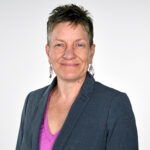
I actually intended to get into insurance from the beginning. When I was a junior in high school, I went to my math teacher to ask about what I could do with a math major apart from being a math teacher. She told me about actuarial science as a major and being an actuary as a career, and my path was sealed then. I went to University of Nebraska, which was close to my hometown, and studied Actuarial Science.
I started my career in CNA’s property and casualty department as a pricing actuarial analyst. This was a tremendous place to grow my career thanks to its rotation program. I had exposure to a broad range of pricing assignments and rose to a leadership role during the 12 years I was there. A few years after joining Zurich, I moved into an underwriting manager role overseeing the commercial auto program, which was a little daunting initially, but I thought, if it didn’t work out, I could always go back to pricing. I got my Chartered Property Casualty Underwriter designation during the first year of my transition, which was one of the best things I’ve done in my career, and I learned that I love insurance coverage.
I applied and got my next role as the head of product development, which was a great responsibility that involved a lot of project management and change management. This experience led me to my current role as the head of new programs for Middle Market at Zurich and, eventually, to the head of programs.
Do you have any mentors who helped guide your career?
Yes, I had many, and some of them I didn’t recognize as my mentors until later. The most significant mentor I have is Greg Massey, who recently retired from Zurich. He was my biggest career champion; I wouldn’t be where I am today without him. Greg was really good at providing immediate feedback, and he saw something in me that I didn’t see in myself. Kyle Nieman from my CNA days was another mentor; he allowed me to work part time from home when I had a young family and, as a result, provided the work-life balance I desperately needed to succeed. This is common practice now but unheard of back then, especially since I was a people manager. I learned from Kyle the value of creating a tailored solution for each situation and appreciate him still today for going above and beyond for me.
What are you looking forward to accomplishing in your current role?
I am looking forward to developing talents and creating a strong succession plan within my team. I want to continue to spark curiosity and create passion by learning the unique perspectives of the individuals I work with. I want to leave the team better than when I found it. I am also looking forward to continuing to advocate for women and make sure diversity and equity are considered in our operations. This is important both to me and to Zurich as a whole.
I have been inspired by how outspoken and supportive Zurich's CEO, Mario Greco, is about social issues, and how ambassadors like you help promote and live those core values. Are there any specific employee programs at Zurich that you would like to highlight?
Zurich has a strong program with its Employee Resource Groups. It includes groups like Women’s Innovation Network, ABILITIEZ (for disabled individuals), VETZ (for veterans) and PRIDEZ (for the LGBTQ employee communities), among others, and each affinity-based group is sponsored by an executive. During the pandemic especially, it was a lifeline for many, including myself, as it allowed me to connect with my colleagues in a safe, healing space.
Zurich’s Apprenticeship Program is another wonderful resource that provides a career path for young people who have the aptitude but not the typical opportunity. During a two-year commitment, apprentices are paid a full-time salary to work part time at Zurich while also earning an associate’s degree at a local college. Completion of the two-year commitment brings guaranteed job placement. This has been a successful way to grow talent in the insurance industry and foster diversity in our workforce.
What suggestions do you have for program administrators working with various carriers’ program businesses?
In addition to being the great underwriters you are, invest in data and technology platforms. Make sure you capture and obtain data with the required granularity (buy third-party data, if necessary), and invest in the talent to be able to process and understand the data. Invest in a technology platform, as that is the way to stay ahead of the competition.
If you were no longer working, what else would you enjoy doing?
I love to golf and can imagine myself spending a lot of time golfing when I am no longer working. I also love to cook, and I would open a bed and breakfast serving afternoon appetizers and fresh food from my garden.
Thank you, Denise! We hope to visit you in that well-deserved B&B someday!
###
Interview: Kathleen Carey, Paragon
We are inspired by people who are passionate about insurance, project finance, and technology that solves pressing global challenges. In this interview series, our chief actuary, Sherry Huang, talks with friends of New Energy Risk whose work makes a difference, and whose journeys will inspire you, too.
By now, you have probably heard that New Energy Risk has been acquired by Paragon Insurance Holdings (see the press release for more details). Together, we are even better positioned to bring innovative solutions to our clients and partners while Underwriting a Greener Future. For my first interview since our new partnership, I reached out to Kathleen Carey, vice president of underwriting operations at Paragon, to learn about her journey and her work for our new owner. Kathleen is genuine, engaged, and passionate. She is also a true team player; from the start, she wanted to highlight other Paragon leaders. With such a great group of colleagues, we know NER is in good hands!
Kathleen, how did you get to where you are today? Did you ever imagine a career in insurance for yourself?
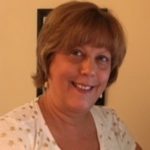
This is not intended to be a cliché response, but I got where I am through focus, hard work and self-education. (Editor’s note: Kathleen has certifications obtained through IIA CPCU, AKA the institutes, and is an active member of the Association for Insurance Compliance Professionals and currently pursuing her ACP designation.)
I didn’t set out to work in insurance. I started in computer operations (back when they had reel tapes and disk packs!). I had moved to the Hartford, CT area and applied for a second-shift operator position at Orion Capital. Instead, they offered me a different opportunity working with statistical codes for insurance policy entry into a DOS-based system. I decided to accept the job since I was newly married and preferred to work first shift. That’s how my career in insurance started!
From there, I moved through methods and procedures, underwriting, and program management, then progressed into new business coordination to assist with the operations of program launches. My career reached a pivotal point when I got involved with the launch of an alternative risk specialty program division. The program involved multiple reinsurers covering layers over primary limits on specialty ‘niche’ program business, which was a fairly new concept back in the mid- to late-90s, and what many MGAs were looking for at the time. My career progressed from there, first as the business services manager at Artis Group, director of operations for professional liability at Travelers, then vice president of operations at AIX overseeing ratings, premium audits, loss control, and compliance. At Paragon, I am now vice president of underwriting operations; I manage our support services, underwriting assistants, and premium audits.
For an audience that might not be as familiar with insurance, what’s the essence of a program business, which is Paragon's bread and butter?
Program business is niche business and unique in nature – it is not ‘cookie cutter’ insurance. For example, our contingency cancellation program provides coverage for special events, festivals, rock concerts and the like. Paragon offers underwriting expertise in these lines of business and unique coverages, so we can provide excellent service to our agent partners and maintain a solid reputation in the marketplace.
Every day here is different. We are always evolving, looking for ways to do things better, and building to stand out and be top notch.
Throughout your career, have you had any mentors who helped shape your career or inspired you? Have you ever been able to mentor someone else?
I’ve been lucky enough to have many mentors. I had a very supportive vice president of operations early in my career at Orion Capital who gave me that shot to become the new business coordinator. After I moved into underwriting, a great program manager in the transportation division took me under his wing and taught me the ins and outs of underwriting. Then there was my boss at Artis/AIX (now president at Paragon), who had confidence in me and challenged me to take on a role managing compliance, something I didn’t know much about at the time. My current manager, our COO at Paragon, has been very supportive and always listens to and values my ideas.
These invaluable mentorships helped build my own leadership style. I try to recognize people’s strengths and acknowledge their accomplishments. I have mentored many colleagues who were new to their management roles. Also, multiple people who have worked for me in the past have moved on to have successful careers. Some of them I’ve had the opportunity to recruit back onto my team again.
Tell us about Paragon’s recent and future growth and how that has influenced your day-to-day work?
Paragon is focused on solid M&A opportunities with businesses that are well established, have expertise within their staff, and fit our business model. I’ve only been with Paragon for a year and a half, and the approach has been quite successful for us even in just this time. The growth certainly influences my day-to-day work by ensuring I learn as much as I can about the new programs and work collaboratively with my team to launch the programs successfully.
Paragon has many growth opportunities ahead as we are only eight years young. Of course, I’m excited about the new business opportunities but also infrastructure growth, investment in people, service improvements, increased data reporting... all the things that will keep us at the top of our game.
What advice would you now give to yourself back when you were starting your career?
Bet on yourself; be confident in taking a chance to step into something unfamiliar and learn from it.
Thank you, Kathleen! Here's to a great NER-Paragon partnership!
###
Interview: Sanchali Pal, Joro
We are inspired by people who are passionate about insurance, project finance, and technology that solves pressing global challenges. In this interview series, our chief actuary, Sherry Huang, talks with friends of New Energy Risk whose work makes a difference, and whose journeys will inspire you, too.
I met Sanchali Pal, CEO and founder of Joro, through our shared office space in Oakland, CA. She and her team always have a very focused look, which made me curious what they do! Joro is an application that helps people track their carbon footprint and offers ways to manage, reduce, and offset their emissions. I started using Joro myself after meeting the team behind it, and have already changed my behavior as a result. I am grateful to get to know people like Sanchali and her like-minded team who contribute to the net-zero journey with their innovative product and approach.
Sanchali, what motivated you to start Joro?
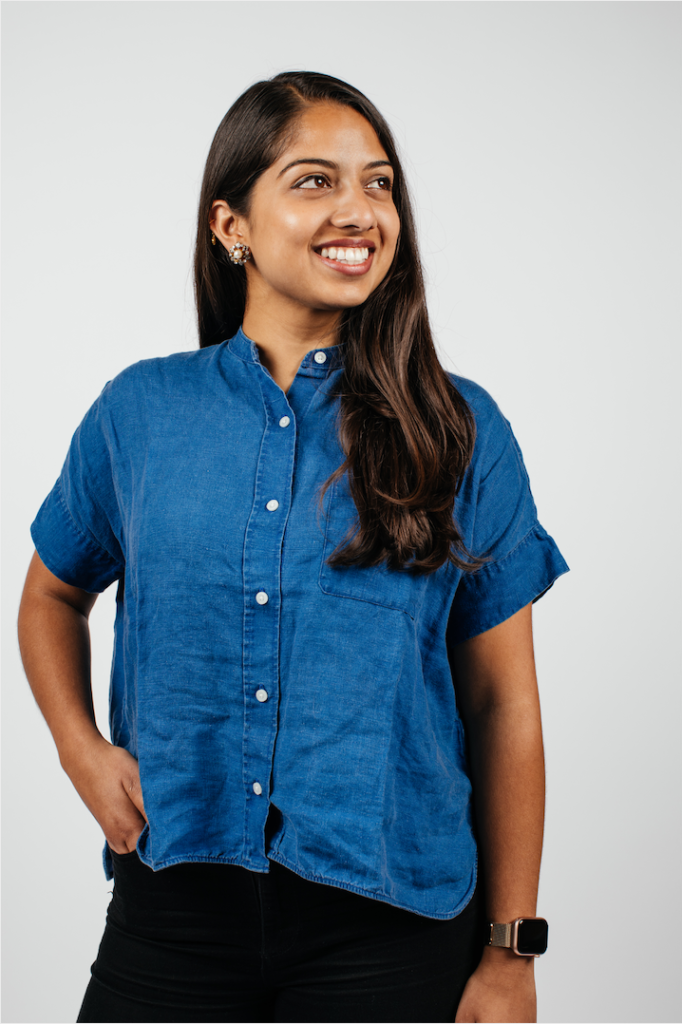 I started tracking the carbon footprint of my food consumption in college after watching the documentary Food, Inc. At the time, I was working in the dining hall and studying economics. I believed that changing the way I consumed food would have a ripple effect in the aggregate with others, that we could change demand and eventually shift how food is produced and supplied. I had a spreadsheet to track my consumption and made small but consistent changes such as eating meat less regularly.
I started tracking the carbon footprint of my food consumption in college after watching the documentary Food, Inc. At the time, I was working in the dining hall and studying economics. I believed that changing the way I consumed food would have a ripple effect in the aggregate with others, that we could change demand and eventually shift how food is produced and supplied. I had a spreadsheet to track my consumption and made small but consistent changes such as eating meat less regularly.
I continued to track my carbon footprint after college and expanded my scope beyond just food. As part of this effort, I started to bike and walk more and created an annual carbon budget for the flights I took. After graduation, I worked as a management consultant in New York, then in India and in Ethiopia. There, I witnessed firsthand the devastating effect of climate change on the poorest economies and became convinced that solving climate issues needed to be my primary focus. Meanwhile, I was still using my spreadsheet tracker. Friends and family by that point were asking me to share my tool so they could track their carbon footprints, too. Eventually, I went back to business school and then started Joro to help consumers develop a “carbon intuition” and empower people to take climate actions that matter.
Currently Joro’s platform connects with consumers’ financial activities via their credit cards. We decided to focus on providing this platform directly to consumers to provide a long-term carbon intuition at the individual level. Ultimately these same individuals are decision makers at corporations, too, so the impact ripples beyond personal choices.
What is the key challenge you are trying to solve at Joro? What’s your near-term goal for Joro?
We focused on developing the core technology over the last 18 months. We are now focusing on growth and engagement. We want to make sure the product is serving their needs in the most intuitive way. After all, the goal is to provide our customers with a tool to achieve an intuition for their actions that will have an impact. We are also working on a subscription program, where users can automatically purchase carbon offsets from our partners based on the amount of emissions their purchases generate.
How have you built your team over time? What is the key strength of your team?
The first funding we received was grant funding – from Harvard, MIT, and the State of Massachusetts. With those funds, we were able to hire undergraduate and graduate students for three semesters to help us develop the beta version of the product. Today, Joro has nine employees, including engineers, a marketer, and a designer. We’ve built our team almost entirely during the pandemic. As a team, we encompass the different personas of Joro’s users; we have diverse backgrounds and experiences, but all of us are passionate about the power of people to catalyze systems change, and we share a strong bias for action.
Have you had a key mentor in your career? Is there anyone you look up to as a role model?
I’ve had many mentors in my life, but my mom immediately comes to mind. She has been an incredible support to me and in my entrepreneurial journey, and pushes me to be confident. A CEO at a biotech start-up herself, she is passionate about her work and is an inspiration to pursue my conviction in Joro.
When I was in high school in Boston, I was intrigued when I heard on the radio about an MIT professor, Amy Smith, and her innovative solutions to fight poverty. My mom encouraged me to reach out to her, and after some resistance, I did. But she didn’t reply. So my mom suggested I follow up twice more until Professor Smith finally replied, and sure enough, I ended up with an internship at MIT the next summer. I learned from my mom to follow my passions and be persistent about pursuing them.
Another mentor who has helped me is Professor Shikhar Ghosh at Harvard Business School. His class, Founders’ Journey, focused on the human side of building a business, and gave me the guidance and inspiration I ultimately needed to start Joro.
Any advice for other founders in the technology industry? Especially for women founders?
It is really hard to be a solo female founder. I came to the Bay Area without knowing how the venture capital market works and had to overcome a steep learning curve.
I have two pieces of advice: 1. Remember your conviction – believe that the problem you identified is worth solving, and you are the perfect team to solve it. 2. Persistence is the key. It’s important to remind yourself to differentiate between the success of the company you founded versus your own success. Your company may have setbacks, but you will still have achieved a great amount with your team and as an individual.
I learned so much from talking to Sanchali. I encourage everyone to think about how you can do your part to contribute to a net-zero future. As it says on Joro’s website, “Together, we add up”!
###
Interview: Katie Mehnert and Shanta Eaden, ALLY Energy
We are inspired by people who are passionate about insurance and technology that solves pressing global challenges. In this interview series, our chief actuary, Sherry Huang, talks with friends of New Energy Risk whose work makes a difference, and whose journeys will inspire you, too.
I got to know Katie Mehnert and her company, ALLY Energy, early this year as NER was expanding our team. We decided to post our open positions on ALLY’s job search platform based on our shared values of diversity, equity, and inclusion (DEI). I was also introduced to ALLY’s new COO, Shanta Eaden, who had just joined ALLY with a background in DEI and operations. Inspired by ALLY’s mission to create an equitable energy transition, I set out to talk to Katie and Shanta about their vision for ALLY.
Katie, tell us about what inspired you to start ALLY Energy?
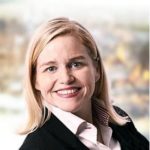 The idea to create an online community for women in energy was born seven years ago during a flight from London to Houston. I was a safety executive at BP and traveling back home when a fellow passenger asked: “What’s a pretty young lady like you doing in a dark, dangerous business like oil?” A light blub went off for me to fix this perception – both the perception of the oil and energy industry and the need to accelerate the progress for women. Pink Petro was launched a little over a year later on International Women’s Day in 2015. It was a socially charged name, but I wanted to shake the market. At the end of 2020, we worked on rebranding the company and launched ALLY Energy. ALLY represents a force for good and is inspired by my daughter Ally.
The idea to create an online community for women in energy was born seven years ago during a flight from London to Houston. I was a safety executive at BP and traveling back home when a fellow passenger asked: “What’s a pretty young lady like you doing in a dark, dangerous business like oil?” A light blub went off for me to fix this perception – both the perception of the oil and energy industry and the need to accelerate the progress for women. Pink Petro was launched a little over a year later on International Women’s Day in 2015. It was a socially charged name, but I wanted to shake the market. At the end of 2020, we worked on rebranding the company and launched ALLY Energy. ALLY represents a force for good and is inspired by my daughter Ally.
What is your vision for ALLY?
ALLY is an online community for the energy workforce, powering an equitable energy transition.
We are capturing the opportunity that combines a desire to connect in new, meaningful ways and the need for the entire energy industry to work together towards an equitable transition. The vision is to focus on the intersection of equity, environment, and emerging economy and energy transition.
The ALLY Council connects members of the energy industry with resources and best practices to provide a platform for dialogues and actions to address equity and inclusion. Our council members recognize we are in a multi-decade energy transition and need to develop the pipeline for top talent to stay competitive. ALLY’s ESG Council (with a corporate focus on environment, social, and governance issues) allows members to collaborate, share, and learn together on their most pressing ESG issues and celebrate wins. The ALLY platform also includes various awards, podcasts, and publications which promote successful and inspiring women leaders and trail-blazing companies in the industry. The goal is also to create a marketplace with high-quality and high-impact content, and help industry members make sense of the noise and focus on what’s helpful with proof points.
Shanta, tell us a bit more about how you get to where you are today and what are you most excited to achieve at ALLY?
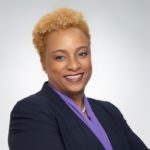 I was born and raised in Houston, Texas and started my career in the banking industry with an operations focus. I moved to working at Weatherford, an oil and gas service company and started a project management office for a multimillion-dollar IT portfolio. At Weatherford, I also started and led a diversity and inclusion program and supported multiple employee resource groups, which is how I met Katie. Joining ALLY allows me to combine my passion in DEI and my strength and experience in technology and operations to jump on the train with the industry to push for a more equitable workplace and energy transition. I am most excited about learning what companies are looking for in terms of talent and DEI to enable the energy transition, and how we can best service them to enrich the journey.
I was born and raised in Houston, Texas and started my career in the banking industry with an operations focus. I moved to working at Weatherford, an oil and gas service company and started a project management office for a multimillion-dollar IT portfolio. At Weatherford, I also started and led a diversity and inclusion program and supported multiple employee resource groups, which is how I met Katie. Joining ALLY allows me to combine my passion in DEI and my strength and experience in technology and operations to jump on the train with the industry to push for a more equitable workplace and energy transition. I am most excited about learning what companies are looking for in terms of talent and DEI to enable the energy transition, and how we can best service them to enrich the journey.
Katie and Shanta, who is a mentor for you in your careers?
Katie: I have many great mentors and teachers. I am thankful to Sheryl Sandberg; the question she posed, “What would you do if you weren’t afraid?” struck a chord with me and started my journey to create ALLY Energy.
Shanta: My mom, who raised me and my three sisters with such grace. She was a lifetime educator. I look up to her and am thankful of all the values she instilled in me.
Shanta, what data are available on DEI in the energy workforce? Do you believe a more diverse workforce, and more diverse leadership in particular, will accelerate this transition, and how?
There are some standard statistics, such as the distribution of workforce by gender and ethnic background, but even these statistics can be hard to obtain especially with a global operation. For inclusion, other data to track could be retention rate or engagement level. Companies that make an early commitment to track these data will succeed in their DEI objectives. Studies have shown that diversity improves innovation, which improves profitability and enables the innovative energy transition. We need to have decision makers, especially those of majority groups, act on the findings of these studies. Representation matters; young employees early in the pipeline are more likely to grow with the company if they can identify themselves with someone in the leadership group. In 2021, companies cannot afford to ignore diversity and equity in building their human capital strategy.
Congratulations on ALLY’s recent acquisition of Clean Energy Social! Tell us about this acquisition.
Katie: The addition of Clean Energy Social expands ALLY’s platform to unite solar, wind, oil and gas, power and utilities, biofuels, hydrogen, carbon capture and other segments contributing to the energy transition. We can speed up decarbonization by centralizing resources into one digital experience.
Shanta: This acquisition doubles the size of our community and marks the opportunity to build insights into our product to ensure candidates are well-matched with a company. We are excited about the future of our roadmap and look forward to continued growth.
Thank you, Katie and Shanta, for this interview. We are inspired by your authenticity, and your passion and dedication to a more equitable energy workforce and energy transition.
###
Interview: Dr. Jessica Morris, Expert Engineer in Atmospheric Dispersion, Exponent
We are inspired by people who are passionate about insurance and technology that solves pressing global challenges. In this interview series, our chief actuary, Sherry Huang, talks with friends of New Energy Risk whose work makes a difference, and whose journeys will inspire you, too.
This interview has been lightly edited for clarity.
Dr. Jessica M. Morris is a senior associate specializing in fluid dynamics and safety in the Thermal Sciences practice at Exponent, an engineering and scientific consulting firm. I reached out to Dr. Morris through Dr. Sean Dee, someone we have worked with in the past. I enjoy talking with women scientists and engineers to learn about their unique career paths, and I had a terrific time getting to know Dr. Morris, who is positive, disciplined, and passionate about helping and inspiring others.
You have such an interesting and impressive career path. How did you decide to pursue a PhD in engineering and get to where you are today?
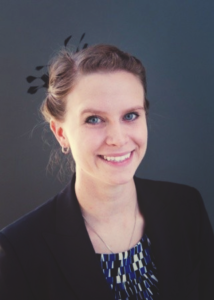
I completed my undergraduate coursework in chemical engineering at the University of Minnesota at Duluth. Due to a clerical error in my graduation date, I was required to continue with courses for an additional semester in the fall. I decided to make the most of the additional learning opportunity. I continued working part-time as a pharmacy technician, as well as working as a teaching assistant for the Chemical Engineering department. I attended a talk on “fracking” presented by a professor at the University of Arkansas. This professor was super nice, very personable, and most importantly very into what he researched. After the talk, this professor asked several students if they were interested in graduate school. The idea of earning a PhD in engineering had not crossed my mind before, since it was not an option when I was contracted with the Air Force, but I had received news of approval for an honorable discharge two days prior. I was at a crossroads and needed to figure out my future and pursue other opportunities. This professor received my resume from our department head the next day, and several days later offered me a full-ride scholarship and stipend for graduate school. I was thrilled to tour the university where I had the opportunity for a fully-funded doctorate in chemical engineering.
Research focuses at the Chemical Hazards Research Center were highly applicable to a real-world industry setting, which set me up for success. I felt at home with focus areas that were directly related to my interests, having minored in aerospace and environmental engineering. The mentorship was another selling point for the program; I was set up with a very well-respected and attentive advisor, Dr. Tom O. Spicer. I was grateful to have funding through DNV GL and the Dutch government, which gave me the opportunity to work in London during my PhD. Everything fell into place. While a myriad of factors played a role in my choice to pursue a doctorate in engineering, I believe my willingness to engage with others, openness to new opportunities, and work ethic were of the greatest importance in the pursuit of my career.
I ended up at Exponent through meeting a representative from Exponent at an industry conference, the Global Congress on Process Safety, during the last year of my PhD. He invited me to participate in the Loss Prevention Symposium committee the following year due to my research, but then took the time to tell me about Exponent and the engineering consulting field. Exponent turned out to be the perfect fit for me, as I get to utilize the expertise I built in my graduate program, communicate technical findings to a variety of clients, participate in numerous professional development opportunities, and continue to learn about new technologies across multiple fields.
What are some of the unique perspectives you and other women engineering leaders bring to the team?
Although growing, there still are not many women in the engineering field. In many situations, I have found myself being the only woman in the room. While sharing stories of biases we have collectively faced leads to greater awareness, more must be done to facilitate advocacy. It is important that we support our peers and do not stand by as witnesses to bias in the workplace. Acknowledging bias supports the individual facing the discrimination, and also has an impact on the overall office culture. For example, in the workplace women are interrupted at a rate much higher than men, which greatly impacts the ability of women to share their ideas in a professional setting. Supporting other women by addressing interruptions can be helpful in changing office culture. The statement “what were you saying before you were interrupted?” can be a helpful way to allow women to continue having a voice. It is important to me to be an advocate for others. I am aware of the challenges women and minorities face in the workplace and if I can make it easier for someone coming in by giving advice or sharing my mistakes to make them more successful, I will always take the time to do that.
What are some of your passions outside of work?
I am passionate about working with kids and acting as a role model for them. I think the challenge of hiring more diverse talents needs to be addressed at a younger age. Kids often decide to pursue a STEM path in middle school, so providing a positive learning environment and more role models for them during this age is so important. I participated in multiple inner-city middle school mission trips in the past and continue to participate in the “Skype a Scientist” program. I am currently in training to become a Court Appointed Special Advocate®/guardian ad litem volunteer to advocate for children who have experienced abuse or neglect.
Do you have a mentor in your career who helped you find the way?
I am grateful to have had positive mentorships in several settings. I have found mentors care about my professional growth, as well as my personal development. Just because someone is assigned to you, does not mean that they are always going to be your mentor or have your best interest in mind. It is on you who you choose to be in your life, to go to for help, and especially to go to for advice. Throughout a career, you will need to seek mentorship through multiple avenues. Each job, each opportunity, each milestone in life, I have had a great network made up of multiple people that are cheering me on. From classmates helping me get through my undergraduate degree, knowledge shared by my advisor while completing my doctorate, supportive coworkers providing real-world experience, and managers who have taken the time to help me in my professional path forward and personal life, I could not have reached each milestone without all of the different mentors and support I have had along the way. I have been lucky to have had the support of the many individuals who have influenced my career path.
Thank you, Dr. Morris!
###
Interview: Kara Owens, Global Executive Underwriting Officer – Cyber & ESG
We are inspired by people who are passionate about insurance and technology that solves pressing global challenges. In this interview series, our chief actuary, Sherry Huang, talks with friends of New Energy Risk whose work makes a difference, and whose journeys will inspire you, too.
This interview has been lightly edited for clarity.
“You should meet Kara Owens,” my reinsurance broker friend suggested to me last summer. “She is a cyber risk underwriting executive and is heavily involved with Markel’s ESG initiatives.” I had mentioned to him that NER is refocusing on our own ESG efforts: the ways we engage in business that is positive for environmental, social, and governance goals.
So, I reached out to Kara who shared the story of her career and her latest initiatives at Markel. Markel provides coverage for specialty insurance and reinsurance for commercial niche markets. Markel is one of the reinsurance partners of AXA XL that works with us at NER.
Kara, tell us about how you get to where you are today, and some of the mentors who showed you the way.
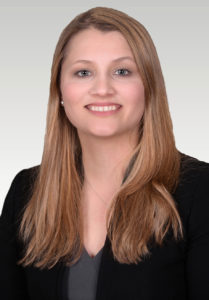
It’s been quite the journey. I am one of those odd ducks that majored in Risk Management and Insurance rather than falling into the industry. I went to Temple
University and had numerous insurance internships in college. After graduation, I accepted a role at Guy Carpenter. I decided after a couple of years that underwriting was more my passion, so I moved to TransRe. I spent eight years at TransRe, moving up from a line underwriter to a global P&L manager for Cyber before age 30. My role at TransRe took me all over the world – from South America to Europe to Asia doing presentations and helping insurance companies start cyber portfolios. I helped form the Women’s Group at TransRe and was on the Board of a project with the Singapore government. I was out of my comfort zone a lot. I truly think being outside of my comfort zone helped to shape my career.
I moved to Markel about three years ago and now I can work with all of the (re)insurance divisions, from fronting paper to Insurtech to alternative capital. I’m on the board of the Association of Professional Insurance Women (APIW), which helps me to give back while doing something I’m passionate about. I am also now engaged on the leadership team for the Markel Women’s Network. I recently became a strategic advisor to a start-up company that advises individuals and firms on how they can measure their impact in building a more sustainable world. When the role of global executive underwriting officer for ESG was established, Markel recognized my passion and I was graciously offered the position. I’m thrilled to continue this adventure!
I have been incredibly lucky with mentors throughout my career. I keep in touch with them all regularly and still need to seek advice to this day! I don’t think that will ever change. What has changed is that I am now acting as a mentor to several mentees. It’s important to me to give back to this industry.
What is your vision for Markel’s ESG practice?
My role is still very new and I’m so excited for what is to come! I think there’s a lot of work to be done in the industry that will really make a difference (while at the same time reducing risk). At Markel, we have always had a strong commitment to our communities and ESG is a natural fit with the culture. I’m in the process of working with colleagues to create an underwriting framework and strategy to allow Markel to better understand, prevent, and reduce ESG risks. There is also a lot of opportunity for product development by enhancing, creating, and supporting products that promote responsible environmental and social efforts.
I see a lot of ways for more collaboration in the insurance industry. We have seen examples already with the United Nations Environment Programme Finance Initiative Insurance Working Group and Principles for Sustainable Insurance initiatives where insurers and stakeholders collaborated on the proposed ESG standards. In addition to the insurance space working together, [the industry can embrace] other partnership opportunities with other industries and initiatives.
What do you enjoy the most about your job? What is the most challenging aspect?
What I enjoy most and what is the most challenging is the same thing for me.
Being involved in two areas that touch nearly every product line provides me the opportunity to constantly be learning, which I really enjoy. But sometimes I feel like I’m drinking from a firehouse as I evaluate numerous products’ exposure to cyber and now ESG.
I really enjoy the concept of ‘round-table’ in underwriting, which describes the need to look at each transaction from many perspectives, including how current events might affect our business and how each transaction/risk might affect our portfolio. I also love the potential to really make a difference with the ESG role.
What is your advice for people entering the insurance industry today?
One piece of advice is to never stop taking advice! There’s always room to grow.
A few more takeaways that have really helped me:
- Even with technology coming full-force at the insurance space, relationships are still the heart of the industry. Make sure to build a network and a support system including mentors.
- Join organizations and take leadership roles within those groups. This will help to build your confidence while building a network!
- Raise your hand when no one else wants to (this is what I did with cyber). Also: speak up. I always loved Ruth Bader Ginsberg’s quote, “Speak your mind even if your voice shakes.” Don’t be afraid to get out of your comfort zone often.
- Never stop learning—whether it’s taking classes or getting designations, going to conferences, taking a new job, or just reading the news and applying it to the insurance industry—there are always opportunities to grow.
- Find your passion. My passion seemed to change over time, but I always let it guide me in my decision making.
- Give back! This is an area where this industry never ceases to amaze me. I have met some of the most charitable people in insurance. Also, as you grow in your career, give your time to mentor and to organizations such as Gamma Iota Sigma or [elsewhere] such as universities to recruit talent into our amazing industry.
- Take care of yourself. It’s often difficult to balance it all, but it’s more important now than ever! Meditation, building in small breaks to my workday and going for walks outdoors have really helped me.
Thank you, Kara, for this interview. You inspire me with your can-do attitude, your desire to give back, and your passion for insurance-related ESG potentials!
###
Interview: Audrey Lee, PhD, Clean Energy Senior Executive
We are inspired by people who are passionate about technology that solves pressing global challenges. In this interview series, our chief actuary, Sherry Huang, talks with friends of NER whose work makes a difference, and whose journeys will inspire you, too.
This interview has been lightly edited for clarity.
I first ‘met’ Audrey through a few shared online interest groups. One day I saw that she had posted about being a co-chair of Clean Energy for Biden. (I subsequently found out that Matt Lucas, NER’s managing director of business development, is also involved in the same organization.) This piqued my interest, and I then learned that Audrey has an impressive background with a wealth of diverse experiences. She has done everything at work from scientific research, policy and regulation, big data and analytics, product and market development; she is now a Board director for ArcLight Clean Transition Corp, a special purpose acquisition company with a focus on sustainability and clean energy. I spoke with Audrey on the eve of Election Day with great anticipation. Audrey is personable, open, driven, and enthusiastic about the work she is doing to promote the clean energy sector.
When did you first start working on energy-related technologies? Was there a pivotal opportunity or individual who led you to working in the renewable energy sector?
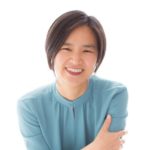
I first discovered energy policy in graduate school while struggling with my PhD in electrical engineering. I took classes in public policy with Professor Denise Mauzerall at Princeton and I loved how directly impactful to society it is. Professor Valerie Thomas was also an early believer in me and she helped give me a lot of confidence. When I graduated, I joined the Department of Energy through a Presidential Management Fellowship. I highly recommend that program, which targets recent graduates with an advanced degree for federal government public service. At the DOE Policy Office, under the guidance of Carmine Difiglio, I found a way to be the bridge between the technical analysts and modelers at Brookhaven National Lab and White House policy decision-makers.
Can you tell us about the most rewarding project that you worked on in the last few years? Between being an advisor to the California Public Utilities Commission, running Sunrun’s Energy Services group, and co-chairing the Clean Energy for Biden initiative, I am sure it’s hard to talk about only one!
I love proving that something new can be done. At Advanced Mircrogrid Solutions, we replaced fossil fuel power plants with an aggregation of batteries at customer sites. With Sunrun, we entered the ISO-NE capacity market with the aggregation of rooftop solar and batteries. Most recently, it has been great to be involved in Clean Energy for Biden – a volunteer organization – and witness the impact that we made from hundreds of active volunteers and 10,000 members.
Tell us a little more about the Clean Energy for Biden initiative.
We have three goals: fundraise, get out the vote, and provide policy recommendations. We leverage diverse skills of volunteers, across the country with more than 30 state/regional/affinity teams. Check out the upcoming policy summits on November 16 (4-6pm PT) and November 23 (4-5:30pm PT):
https://www.cleanenergyforbiden.com/policysummit
Do you have any advice for women who are pursuing a STEM career, who wish to maximize their impact using their backgrounds and skills?
Personally, my education in applied physics and electrical engineering provided a good foundation. I would encourage women to explore, talk to people, and understand the problems they are trying to solve. I’ve always loved learning from other people – including from my own family. My Dad is a physicist, and my mother is an entrepreneur. My general advice is never be too comfortable; ask yourself how can I learn more, how can I apply a quantitative, analytical approach to solve a problem.
Which areas require the most work in advancing clean energy solutions? Policy/regulation, innovation in technology solutions, or private investment?
Many technology solutions are economically competitive for clean energy already, and private investment, such as ArcLight, is ready to deploy investment and reduce the cost of capital. On the technology innovation front, we need more technology solutions for negative emission, such as carbon capture, to help achieve a rightfully aggressive clean energy goal of net-zero emissions by 2050. I think we have the most need for policy at this moment. Policies that set the rules of the game, set mitigation goals, and let competitive technologies and market solutions participate. Such policies can go hand in hand with economic recovery as more jobs are created in the clean energy sectors.
Thank you, Dr. Lee, for talking to me for this interview series!
###
Interview: Connie Joe, Corporate Social Responsibility Officer, Bank of the West
We are inspired by people who are passionate about technology that solves pressing global challenges. Scaling and commercializing those solutions requires serious knowledge, courage, perseverance, and support systems like those who work in the insurance industry. In this interview series, our chief actuary, Sherry Huang, talks with friends of NER whose work makes a difference, and whose journeys will inspire you, too.
This interview has been lightly edited for clarity.
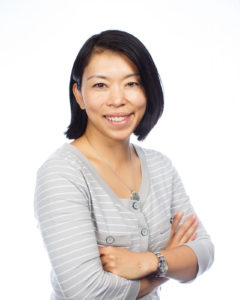
Connie and I met through our kids and we are in the same book club. We seldom discuss work when we meet (our kids are usually in the way!), but recently we realized our work has some common ground. Connie is the Corporate Social Responsibility (CSR) officer at Bank of the West, while I work on an insurance team that supports commercialization of sustainable, breakthrough technologies. After spending some time talking to Connie, I realized we have more professional commonality than I thought! We both work to enable innovative new ventures using the platform of traditional industries, and we each enjoy the aspirational part of our jobs, making a difference for our partners and the world.
Connie, you are always so enthusiastic about your job! Tell us about what you do at Bank of the West.
As a CSR officer at Bank of the West, my role involves setting up and implementing governance guidelines for various mission-driven programs that align with environmental, social, and governance (ESG) initiatives at the company. Along with others on my team, we work on programs that span from community outreach, to governance for new sustainability-related requirements (e.g. no coal business by 2030), and we partner with others in the company to grow new business portfolios such as our Energy Transaction vertical. Both Bank of the West and its parent company, BNP Paribas, have a strong focus on sustainability and a commitment to social issues, striving to be the bank for a changing world.
How do you measure success at work and what are some of the challenges you and your team face?
Our group goal is aligned with the company’s mission to become a leader in sustainable banking. We measure our success by monitoring and reporting on our annual CSR plan. Balancing the cost and benefit of implementing the right mission-driven programs and managing missed opportunities is something that I think all of us have to work with from time to time.
What parts of your job excites you the most?
I sincerely love being able to make a positive difference as the core part of my job. It gives me great satisfaction to know that my role plays an integral part in making sure that we are only financing companies that are supporting energy transition. Bank of the West also has some innovative sustainable financing programs that support energy transition for retail consumers. For example, our ‘1% for the Planet’ debit account provides a carbon footprint tracking tool for every purchase made with the debit card and will donate 1% of revenue to environmental nonprofit partners. I am also proud that Bank of the West is one of the few US banks that has a CEO who is a minority woman!
How did you get to where you are today?
I studied biology in college and started my career as a consultant at Accenture with a focus on public health. Starting out in consulting was a great experience – I loved the goal-oriented, clear-path environment that allowed me to grow exponentially. I decided to move away from consulting after starting a family and got more involved with process and program management. I took a chief of staff position at Bank of the West that enabled me to return to community development through working on the Community Reinvestment team, which eventually led me to the CSR team today.
Did you have a mentor who helped you shape your career?
Yes, I have been lucky to have mentors that have helped me grow and navigate my career. One of my mentors is famous for promoting women into positions that were stretch roles. He constantly challenged us to never become too comfortable in our roles and demonstrated to me how important it is to have an executive who can see your potential before you can. Another mentor was instrumental in supporting [me when I was] finding my way back to working in community development. Her support during my career pivots, even if it was not the easiest path to her organization, allowed me to begin and grow my career in the CSR area.
Thank you, Connie!
###
